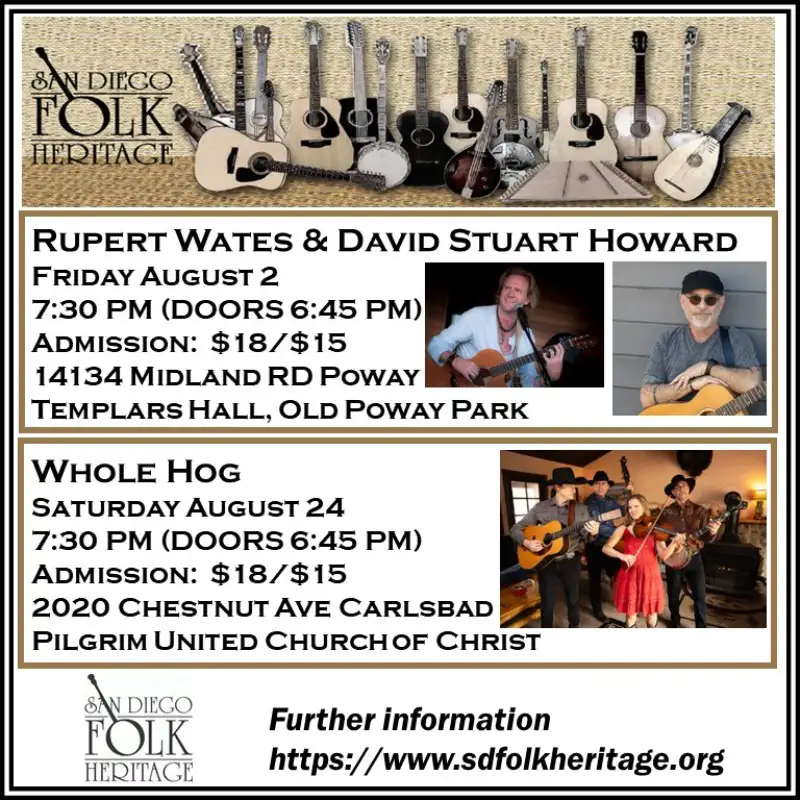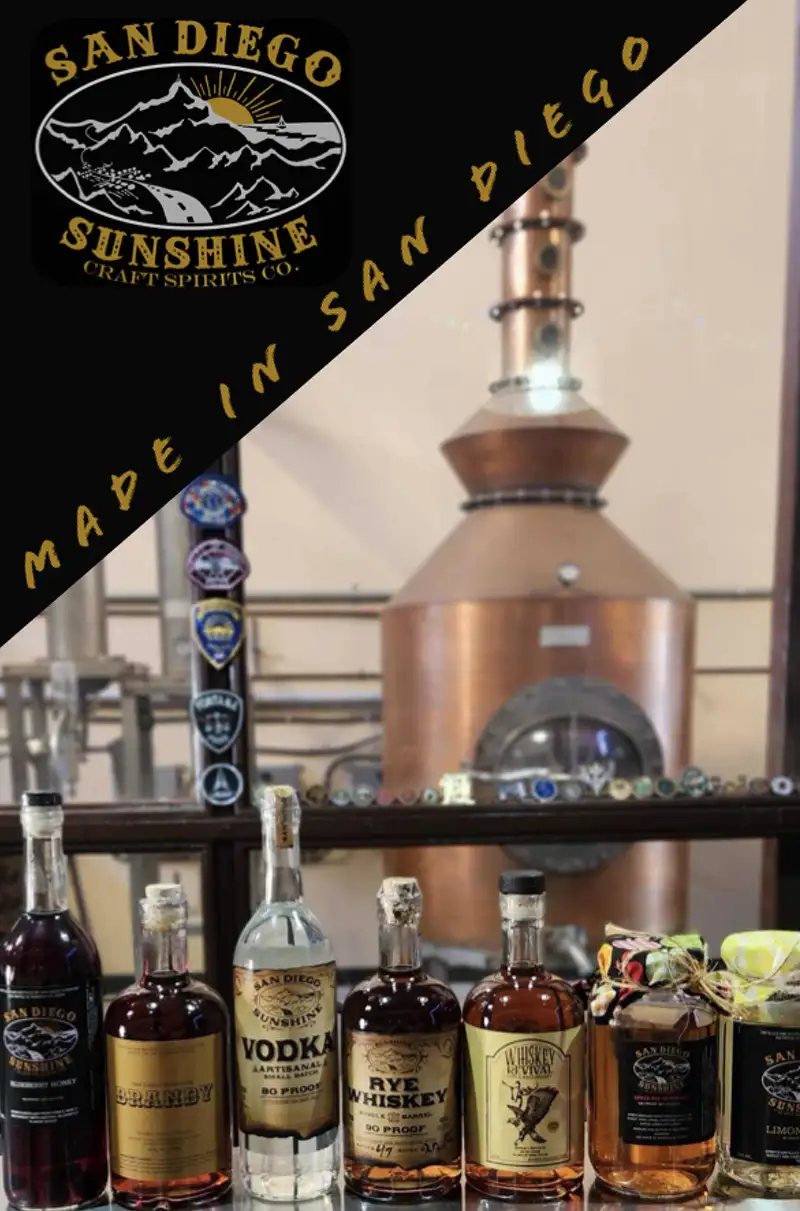Featured Stories
A Lifelong Conversation with Matthew Strachota
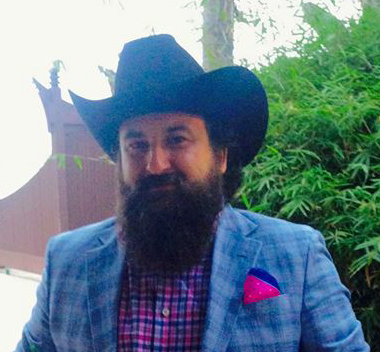
Matthew Strachota. Photo by Patrick Herrick.
It’s 2:30 in the morning on a Monday in 2013. Matthew Strachota is standing on the sidewalk against the wall of a concrete commercial building with a cigar box guitar that was just thrust into his hands by yours truly. At his feet a vinyl record that says Tin Can Country Club rests against his leg next to a small Pignose amplifier. It’s the tail end of the release party for a compilation album we contributed a duet to, and we are riding high.
“What the hell am I supposed to do with this thing?” He barks in a voice that sounds annoyed but is betrayed by a glowing smile. He’s wearing a classic Canadian tuxedo, his denim pants and jacket perfectly faded with a white Stetson finishing the look, like he’s been wearing this his whole life.
“I don’t know. I figure you can play anything.” I respond, “Let’s see if you can prove me wrong.”
I hand him some new-fangled brass slide, advertised as a revolutionary new way to play guitar. He looks at it, scowls even more suspiciously, and lets out another litany of complaints. “I don’t know what to do with this either! What are you trying to do to me!” He protests, with a hint of mischief that betrays a playful spirit behind his long black beard. But when he finally touches the slide to the strings, something magic happens. I am a one-man audience, save for the homeless seeking shelter in the park across the street, who I imagine are wondering what kind of degenerates we are standing out here in the wee hours playing music.
This is the root of our relationship. Staying up long after the bars have closed and sensible people have retired to their beds, bantering and fiddling and generally testing the patience of our wives who’ve long ago given up on trying to wrangle us home at a reasonable hour. So much so, as I slipped out the door at three in the afternoon today to do a follow up interview with Strachota, my wife said with casual resignation, “I’ll see you at 5am.”
She’s not wrong to make this assumption.
Hey there my darling
I know things ain’t been all that you dreamed they would be
I know we ain’t spending no time you and me
So let’s get in my truck we’ll pack up my guitar
and throw in some clothes for a night
Waylon on the radio, we’ll get us out there alright
When I first met Matthew Strachota he was a multi-instrumentalist for Bartenders Bible.
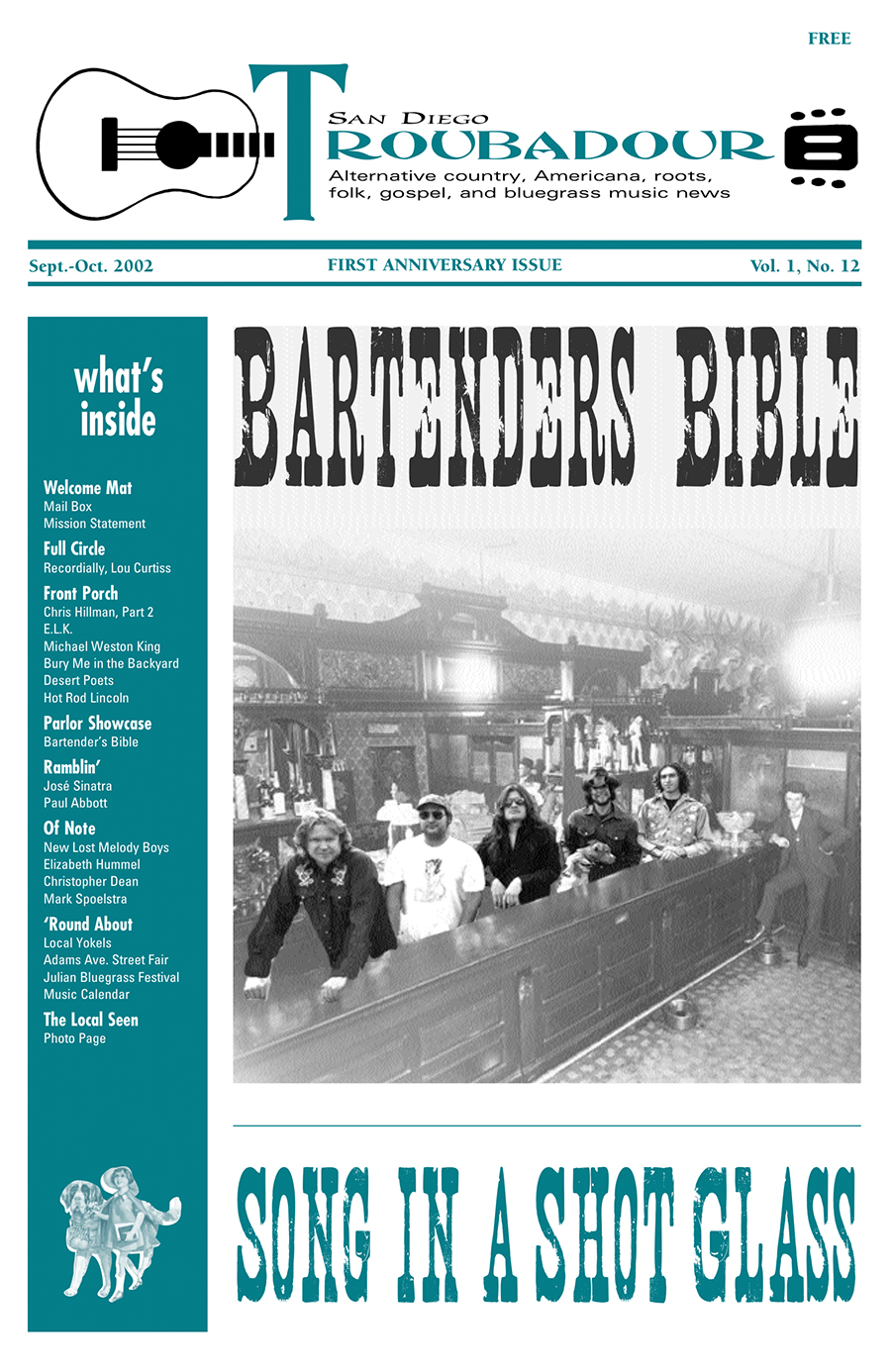
Bartenders Bible on the cover of the Troubadour (Matthew second from left), September 2002.
Bartenders Bible was fronted by the loud, bearded bard Jason Corbin, who wrote whiskey-soaked, cocaine-fueled songs in a tradition handed down through the generations from Hank Williams to Merle Haggard. Propelled by a honky-tonk band full of stellar musicians including Matthew Strachota on banjo, keys and guitar; Jim Austin on the upright bass; T-Bone Larson on drums; and Arabella Harrison bemusedly tempering the madness with her harmonies, Bartenders Bible was loose and fun as hell. They were always a party but, more important, they held down the fort of original country music in San Diego at a time when very few local songwriters even flirted with the genre. They were the undisputed real deal. This reporter was so wholly taken by them, I tried to sign them to a record deal for a record label that didn’t even exist. Corbin, not one to suffer fools, sussed out my ignorance and pie-eyed plans rather quickly, but my friendship with Matthew was sealed during those doomed negotiations that were constantly sidetracked by bouts of absurdly long storytelling, told in a litany of interrupted juxtapositions by all parties who often talked right over each other with clueless glee. Matthew’s wife would eventually take to calling me her “sister-wife,” an honor I cherish with beloved amusement. So if you think you’re going to get anything less than a love letter to Matthew Strachota in this story, I feel the responsibility to rid you of that delusion rather quickly. Unbiased journalism has little chance here.
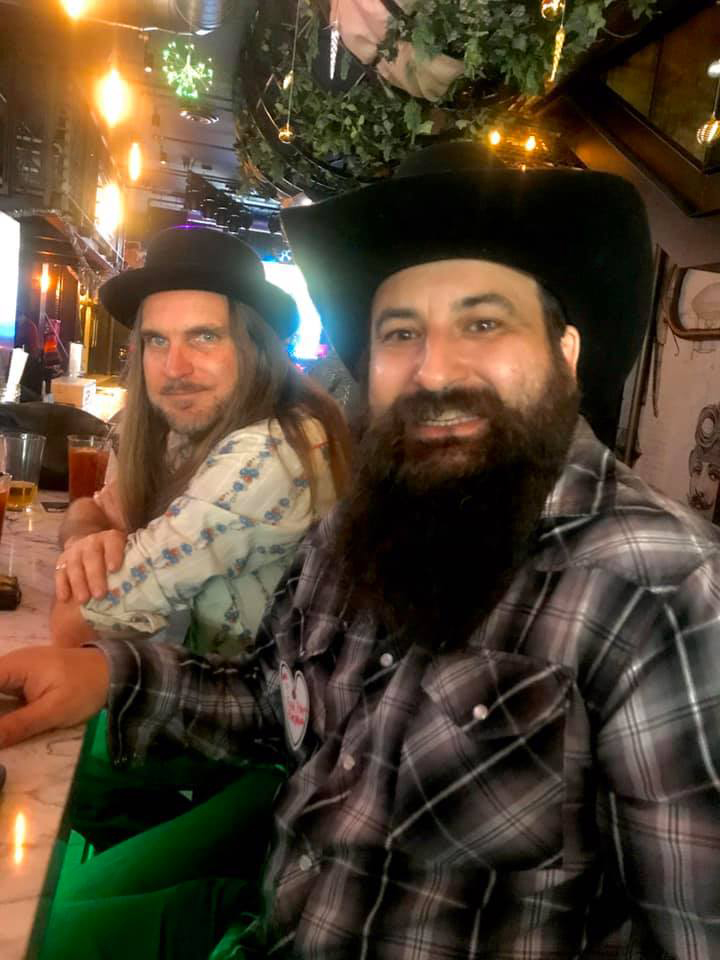
Drew Douglas with Matthew. Photo by Marie Haddad.
But Matthew and I are blunt and unvarnished with one another, so I’ll try to do the same in explaining who he is to you. Hailing from Wisconsin deep in fiercely loyal Green Bay Packer country, his parents made their living in the agricultural business but harbored musical talents for generations.
“My dad and his entire family are really good singers. My dad and his brother would sing these songs and sing harmonies. My mom played piano, not super well, but then I don’t play super well and people put me on stage to do it,” says Strachota with typical false humility. “My grandma played harmonica. My grandma had two sisters and 16 brothers. One even had a gold record in Nashville. They were all very much like me. That’s why my mom worries about me… because they were all really good musicians that also gambled and drank and did it all excessively.” His sister is also a talented singer-songwriter who currently lives in Georgia. Clearly, this is in his blood.
In the late ’90s, Strachota moved to San Diego, brought here by musical ambitions with Dan Wise (of Kill Me Tomorrow). “Moving to California was a series of bad decisions,” he claims. “After I dropped out of college, me and Dan Wise were playing gigs in Milwaukee and loved it. And then we heard about San Diego. This was 1997, there was a lot of rad shit happening in San Diego. And I wasn’t really playing country music then, I was playing rock and roll.”
We’ll drive out of San Diego we ain’t headed toward LA,
we’ll get on that eastern freeway
And when we get there, well, I know a place we can stay
We’ll drive off of the main road, leave Rimrock behind us
to a dirt road where there ain’t no sign
And when we get there we’ll open this bottle of wine
So they packed up and headed west for “The Next Seattle” as the press had branded our town. When they arrived they soon found a welcoming scene and eventually they both landed a spot in Bartenders Bible, first Wise, then Strachota. “I played organ and banjo. And they were opening for Link Wray and I was like, ‘I want to open for Link Wray, do you need a banjo in that band?’ So that was my first Bartenders Bible gig, opening for Link Wray.”
Off stage, Matthew is loud, opinionated, and eager to offer it when properly prompted and with a little booze, requires little prompting at all. He enjoys tequila straight up, but as a bartender of 20 years in an often-packed dive bar, he never begrudged a customer ordering a frou-frou college-student drink with a long silly name, too many ingredients, and far too much sugar. If he wasn’t slammed with orders, he may even pour himself one of those syrupy long shots in a stout glass and click rims with the customer to help them feel at home.
Strachota proudly identifies as a free-market anarchist and cherishes his role as antagonist among his countless communist friends. He is a man equally comfortable carrying a gun as he is bellying up to a barstool with a trans-woman at a gay bar and buying her a drink.
All these things may seem like contradictions in other people. With Strachota, they aren’t a bug, they’re a feature. “In the American sense of conservative and liberal…I think that dichotomy is antiquated and useless at this point. It’s not Left versus Right. It’s authoritarian versus freedom.”
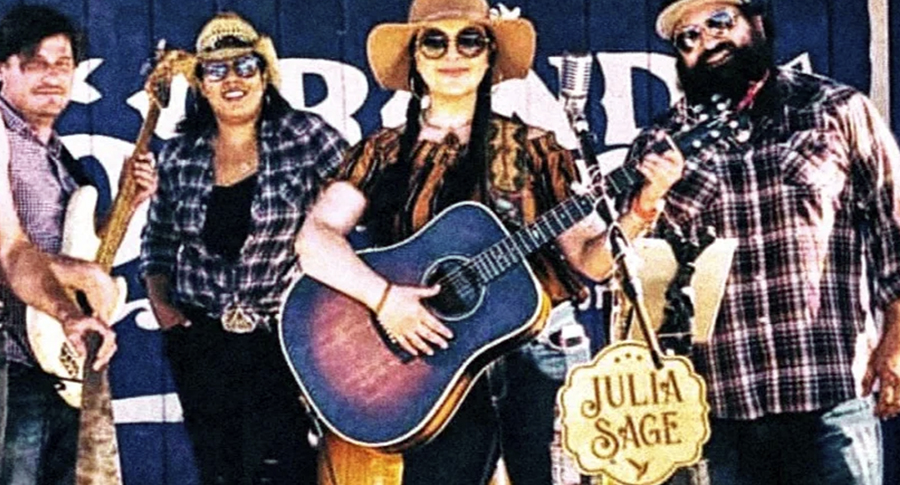
Matthew with Julia Sage and the Bad Hombres.
Strachota is proudly difficult to pin down into any neat category. And his music reflects that. He has played in bands that approach speed-metal with the prog-rock cacophony of constantly changing time signatures in bands like the Long and Short of It. He affectionately calls this band “unlistenable noise,” due not just to their volume but to their refusal to play a waltz for anything longer than 10 seconds before switching into some obscure time signature that only the nerdiest of music-theorists have any use for at all. And yet, while Strachota slides effortlessly between tempos and timing, he’d be perfectly happy to spend the rest of his days playing in 3/4, and today you’re far more likely to find him sitting on a bar stool and with equal skill, crooning one of his own two chord waltzes.
Even his guitar rig is contrarian, defying any traditional pairing of instruments, pedals, and amplifiers. It’s not particularly metal and certainly not country. He plays a Les Paul Gold Top with a guitar strap weighted and bedazzled in Swarovski Crystals. He plugs this into a Silver-Face Fender Twin Reverb, the red-headed stepchild in Fender’s legendary amplifier line, an amp that for decades was only loved by punk rockers and not for its tone but because it was so absurdly loud you could plug a microphone into it and use it as a PA for scrappy punk shows thrown in parks and parking lots. Matthew doesn’t plug his mic into his Twin, but he does plug his banjo into it, a blasphemy that makes pairing a Gold Top with a post-CBS Twin Reverb from the ’70s seem cute. He has no pedal board, eschewing large chains of effects for a single Fuzzface pedal, a temperamental and nasty overdrive developed for Jimi Hendrix but loved by bands like Dinosaur Jr and ’90s grunge artists known for making your ears bleed.
He then steps up to the microphone armed with this rig at his feet and croons a stirringly tender ballad about his love for his son.
Today, Matt is banging it out around town under the guise of Trailduster. He can be found regularly working his craft at songwriter nights like the Writers Round on Mondays at the Ould Sod. Or Sundays at the Til Two Club for Justin Rodriguez’s showcase, Turnstiled and Junkpyled. Or a Saturday at the Whistle Stop for grampadrew’s Flim Flam Revue. If this is starting to sound a lot like a work week to you, you’re starting to understand Strachota. He’s a working class musician. Much like the rest of the working class, he’s getting tired of grinding with little reward but instead of hanging it up, he’s resolved to double down and dig in. He’s currently recording a new Trailduster album that he plans on hustling Mojo Nixon into playing on his Outlaw Country Radio show on Sirius XM. He’s recording with Christopher Hoffee, who when not touring with the White Buffalo, runs a studio from his home in City Heights.
He alternately claims this album is his first or last real go at “success.” I’ve heard this before but there’s an urgency and weariness in his voice I haven’t picked up on in the past. “Playing guitar ruined my god-damned life,” says Strachota in a deadpan exclamation that refuses to reveal his level of seriousness. “I could have been a senator or a judge. Instead, I’m an unemployed ex-bartender with too many instruments but not enough to sell and retire.” I might worry about this in other artists. But I trust Strachota to pour these feelings into his songs and for this to only enrich his brutally honest and fearlessly earnest approach to songwriting. You can’t retire from being a true artist, and Matthew Strachota certainly falls into this category no matter how weary one grows of the affair.
And despite his protests, his fate was seemingly sealed very early on.
“My sister and I, when we were little, had this double cassette deck and microphone attached. And we’d plug in the microphone and play disc jockey. And that would evolve into us making recordings strumming guitars and singing little songs. And so, we were playing before we even knew how to play music. And we started writing our own words to songs.”
It only got worse from there.
“My 18th birthday gift from my grandma was this beautiful Washburn banjo,” Strachota starts but suddenly interrupts himself here to make a sponsorship pitch, “Sorry Deering. I really want a six-string banjo, though. I’d put it on the record I’m making right now.”
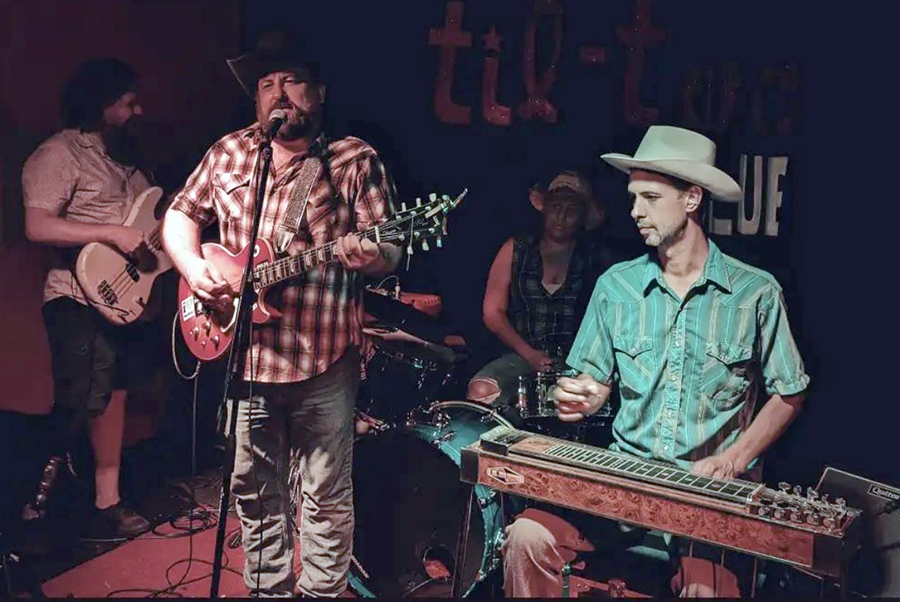
Matthew with his band, the Traildusters.
We quickly lose the thread of his early musical history and continue to joke about coaxing our friend Jamie Deering into making a Matthew Strachota signature banjo. But when he tells me, “I’ll pose naked as a centerfold for Deering monthly,” I know he’s dead serious. If such a magazine existed, he’d proudly get naked for it. For the banjo. For the story. For the laugh.
In fact, when he finishes this honky-tonk record, “The next thing after this record is the Naked project, “ he tells me, “A very personal acoustic record with Gary Hankins using a photograph he took where I’m actually naked. Gary Hankins is going to engineer it.”
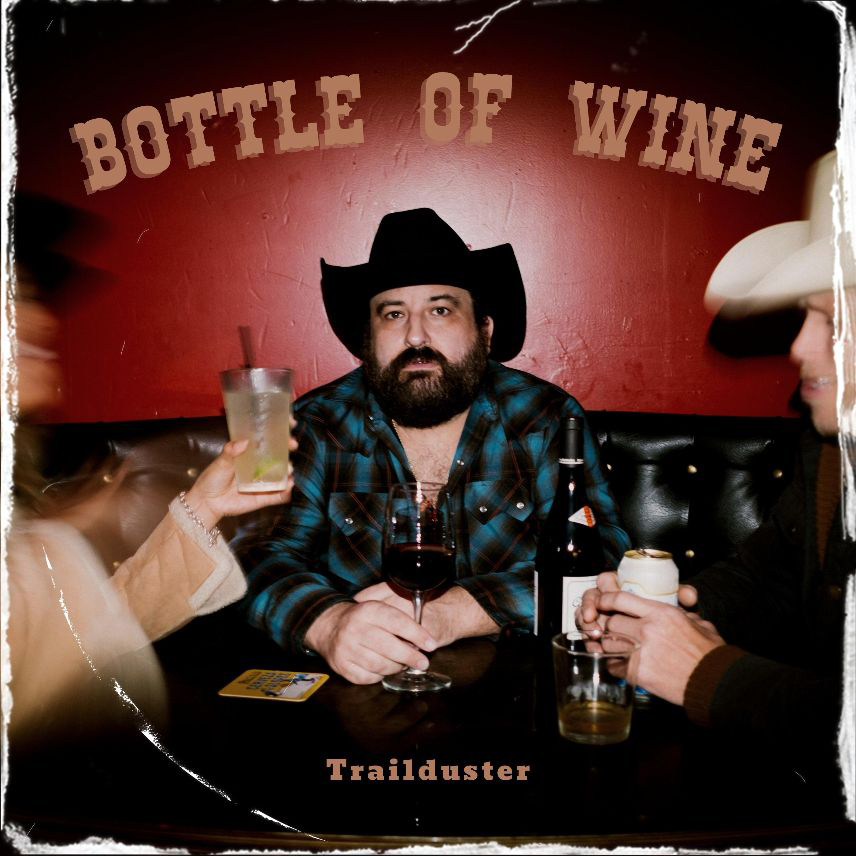
Trailduster album, released last month.
But today he’s putting everything into this Trailduster release. And this time it’s different from his previous projects.
“It’s all my stuff. I’ve made other people sound good for a long time,” but with his latest effort he says, “I’m able to put my vision into this.”
His first single from these sessions is “Bottle of Wine,” and it was just released last month, on February 28th. I could describe it to you but you should probably get the idea by now. If not, just listen to the damn thing yourself for god-sake. It’s available on all the streaming platforms.
Meanwhile Matthew and I sit here on our barstools again, plotting our musical futures and regaling one another in the absence of anyone else. And as I ponder how to end an article about a conversation with a friend that will never end and endlessly meander, it occurs to me, that for once, I can simply give Matthew Strachota the last word. So I’ll leave you with the final lyrics to his newest single, “Bottle of Wine.” Buy it. Listen to it. Go see Matthew Strachota play it live. There’s a good chance you may fall a little bit in love with the man, too.
We’ll dance into fresh snow under high desert moonlight
Just you, me, a bottle of wine
We’ll waltz together every song on the radio
til we forget about the time
Then ‘for the sunrise
When your eyes get tired
I’ll sing you one last song
The way that I used to before things got harder
Just you, me, a bottle of wine
from “Bottle of Wine,” by Matthew Strachota on Trailduster



